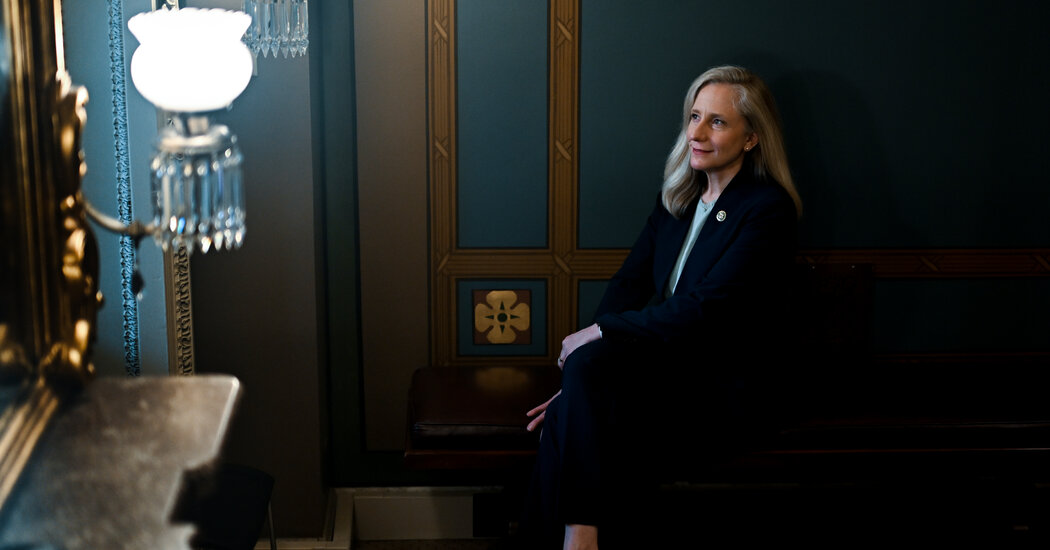Copyright The New York Times

When she takes office as governor of Virginia in January, Abigail Spanberger will step into a partisan war over the political direction of one of the nation’s most respected public university systems. The schools have lately been at the center of a push by Republicans to overhaul universities that they see as having liberal biases. The Democratic victory in the election may test the limits of that effort in public universities, where state politicians often play a significant role in selecting administrators and setting policy. In Virginia, the battle over public higher education has pitted legislative Democrats against Republican-appointed boards, primarily at the University of Virginia and two other public schools, George Mason University and the Virginia Military Institute. Virginia’s governor appoints the board members at each campus who oversee the state’s public university system, and conservative board members and alumni have engineered efforts to oust leaders of the universities, largely over disputes about diversity initiatives. Now, though, Ms. Spanberger will take office as the first woman to serve as governor, with a new Democratic attorney general and her party in control of the General Assembly. She said during her campaign that she wanted to make higher education more affordable, and she voiced support for a plan to change the way university boards are appointed. Her staff did not respond to requests for an interview for this article. Bethany Letiecq, a professor at George Mason University, the state’s largest university, said she expected Ms. Spanberger, a former member of Congress, to defend the state’s university system against the White House, as well as to rescind some of the initiatives imposed in recent years by appointees of Glenn Youngkin, the outgoing Republican governor. “Her influence is going to be really important to try to undo some of the things Youngkin did,” said Dr. Letiecq, president of the campus chapter of the American Association of University Professors. She said she hoped that Ms. Spanberger will set a new tone that includes “a pushback against all the incursions by the federal government.” Virginia may be an early example of how shifting political control could hobble the White House’s national campaign to change higher education. For example, the Trump administration recently secured an unusual agreement with leaders of the University of Virginia, which was the target of several federal investigations. Under the agreement, the federal government said it would suspend the investigations for three years if the university complies with federal regulations, many of them aimed at blocking diversity initiatives, and regularly submits compliance reports. The university’s faculty senate, in an overwhelming vote last month, said it had “grave concerns regarding the content of the agreement, its ambiguity, and to what it binds the university and its future president.” A number of options are on the table for Ms. Spanberger, a University of Virginia alumna who criticized the pressure campaign by the Trump administration that led in June to the resignation of the university’s president, James E. Ryan . Supporters of Ms. Spanberger have said that she would not follow the playbook of her predecessor, who used the governor’s power to select state university board members to push for changes he favored. “I would like to, frankly, strengthen what is clearly a weak system, where universities here in Virginia can become this punching bag” to the detriment of students and professors, she said in an interview with The Virginia Mercury, suggesting she would support efforts to overhaul the appointment process. Republicans were skeptical. Kenneth L. Marcus, a former education department official in the first Trump administration, predicted that Virginia campuses would continue to be “some of the hottest battlefields in today’s culture wars.” Even though Ms. Spanberger campaigned as a moderate, he said, she is leading a progressive party that “wants a set of actions at university campuses that will undo much of what Governor Youngkin’s administration attempted.” Mr. Marcus predicted that doing so would put the state’s university system on a collision course with the Trump administration as well as with the courts. Mr. Marcus, who founded the Brandeis Center, a Jewish civil rights group, was nominated by Mr. Youngkin to serve on the George Mason University board, but his nomination was rejected by the State Senate in January. Mr. Youngkin rode into office in 2022 after campaigning heavily on education issues. One of his first acts in office was to appoint Edwin Feulner, a founder of the conservative Heritage Foundation, to advise him on selecting members to the state’s 15 public four-year universities and colleges. Mr. Feulner died this year, but not before the state’s university boards had been stacked with like-minded appointees. At George Mason, Mr. Youngkin appointed two Heritage Foundation employees, including a drafter of Project 2025, a right-wing blueprint for overhauling the federal government. At the University of Virginia, one of Mr. Youngkin’s choices was Bert Ellis, who founded the Jefferson Council, a conservative alumni group that attacked campus diversity efforts championed by Mr. Ryan, setting the stage for the Trump administration’s Justice Department to demand Mr. Ryan’s ouster. In a statement last week, Joel Gardner, president of the Jefferson Council, echoed worries expressed by Mr. Marcus. “Our concern is that whether or not Spanberger wants to run a partisan administration, the extreme partisans in her party will push her to once again politicize U.Va. with agenda-based appointees who couldn’t give a fig about intellectual diversity or the level playing field,” Mr. Gardner said. Robert D. Holsworth, a Virginia political analyst, said that one of Ms. Spanberger’s first challenges may be the effort by the school’s Republican-controlled board to appoint a permanent replacement for Mr. Ryan before the Democrats take over. “This is a war that Spanberger will inherit,” Mr. Holsworth said. “She says she’s going to depoliticize higher ed, but it’s going to be tricky to do that.” The power of Mr. Youngkin’s conservative appointees also became clear last year at Virginia Military Institute, where 10 of them voted against renewing the contract of Maj. Gen. Cedric T. Wins, successfully ousting the school’s first Black leader. General Wins supported diversity efforts at the school, where a state report in 2021 found that an atmosphere of rampant racism and sexism had existed before he took over. The Trump administration also set its sights on George Mason, claiming that its first Black president, Gregory Washington, unlawfully favored underserved minority candidates in hiring and promotion, and demanded that he issue a public apology. Dr. Washington has refused. On Thursday, Republicans on the U.S. House Judiciary Committee stepped up the pressure campaign against Dr. Washington by releasing a 50-page report that accuses him of unlawfully discriminating against white and Asian job candidates in favor of Black and Latino applicants, and of lying to congressional staff members about the matter. Douglas Gansler, a lawyer for Dr. Washington, strongly denied the accusations. Though there has been speculation this year that the George Mason board would move to oust Dr. Washington, a committee controlled by legislative Democrats has blocked confirmation of more than 20 of Mr. Youngkin’s nominees to university boards, including several at George Mason, leaving the school’s board without enough members to achieve a quorum. When she takes office on Jan, 17, Ms. Spanberger could move quickly to appoint new members that the legislature would be more apt to approve. But Mr. Holsworth, who has served as a dean and board member at Virginia Commonwealth University, another public school, said Ms. Spanberger is not known for being confrontational.



